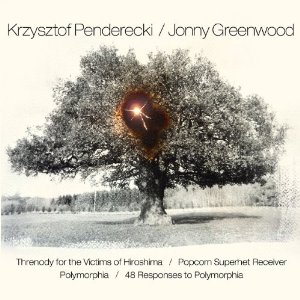Krzysztof Penderecki’s Threnody for the Victims of Hiroshima remains a startling work 52 years after it was composed. Its alarming pile-up of strings—52 separate players—is an experiment in atmospheric noise painting, with the instrumentalists sliding up and down the strings for undisciplined glissandos, playing on the bridge, and thumping the body of the instruments as if they were percussion instruments. The result is a fantastic howl of grief ending on a dissonance that is hard to forget.
The other Penderecki work on this CD is Polymorphia, a similar setting using 48 stringed instruments—24 violins and eight each of violas, cellos, and basses. Inspired by the charts of brain waves of mental patients in Krakow as they listened to Threnody, some of the nightmare effects are made by the players thrashing their instruments with their bows and occasionally using pencils in place of bows; others sound like incoherent mutterings. Low, vibrating strings often add to the menace, almost subliminally. The piece ends with a thoroughly tonal C major chord that is a necessary oasis after such a maelstrom.
But what of Jonny Greenwood, the lead guitarist, keyboard player, and one of the geniuses behind the forward-looking, sophisticated rock band Radiohead? Well, it seems that he and Penderecki have been admirers of one another for years; Greenwood also is composer in residence to the BBC Concert Orchestra. Like Penderecki, many of his works have been used as movie scores. Greenwood’s works recorded here are, in a way, responses to the two Penderecki pieces—one might say the CD is made up of a call-and-response program, or at least a teacher/pupil dialogue. Popcorn Superhet Receiver, which is placed after Threnody, sounds much like the piece before it: without being absolutely imitative, 34 separate string parts mimic Penderecki. Greenwood asks that the players use guitar picks occasionally, and the brain-twirling glissandos and welcome moments of tonality are indeed impressive. There are hints of Messiaen in this work as well.
Greenwood’s other piece, 48 Responses to Polymorphia, is just that—nine short pieces (the 48 refers to the number of strings). It begins immediately after the affirming C major triad of Polymorphia ends and starts where it left off; what follows is similar to a set of variations. The first movement sounds like a Bach chorale; that is followed by a sort of string free-for-all; then comes a dark, quiet, piece with the C major chord popping up just often enough to be the punctuation in an otherwise troubling ambience. And so it continues, sometimes very beautiful, sometimes very disturbing, and always very listenable and questioning.
The recording was made in Krakow after a series of concerts at which both composers were featured; Penderecki leads his work and Marek Mos conducts Greenwood’s. The sound is spectacular—the Threnody in particular has never sounded clearer (even more so than under Antoni Wit on Naxos). When you listen to this—and I recommend it as an adventure in sound—and you believe you recognize some of it, bear in mind that the Penderecki has been used in The Exorcist, 2001: A Space Odyssey, and The Shining, and Greenwood composed the music for There will be Blood and The Master. Yes, this is for the adventurous, but it’s a remarkable meeting of like-minded composers, a few generations apart.
































